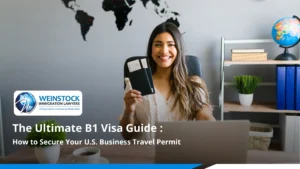USCIS-ITServe Settlement Overturns 10 Years Of H-1B Visa Policies
U.S. Citizenship and Immigration Services (USCIS) has agreed to a settlement with the business group ITServe Alliance that overturns 10 years of policies restricting employers and H-1B visa holders. The settlement follows a pivotal March 10, 2020, District Court opinion that repudiated key USCIS actions and a May 20, 2020, judge’s opinion in Georgia that ruled against USCIS policies.
For many companies, the problems with USCIS began with the “Neufeld” memo issued on January 8, 2010. In that memo, USCIS asserted the authority to deny H-1B petitions based on a potentially restrictive understanding of what constituted an “employer-employee” relationship, including when an H-1B visa holder performed work at a customer’s location.
Issues for companies grew more severe during the Trump administration. “Denial rates for new H-1B petitions for initial employment rose from 6% in FY 2015 to 30% in the first quarter of FY 2020,” according to a National Foundation for American Policy (NFAP) analysis. “As in earlier fiscal years, the highest denials rates are for companies that provide information technology or other business services to American companies.” While all 25 companies with the most approved new H-1B petitions saw their H-1B denial rates for initial employment increase, the denial rate for 12 major companies that provide IT services or other business consulting services increased by 20 percentage points or more compared to FY 2015.
The different standards for adjudications compared to recent years, as well as among different types of companies, took place without Congress changing the law or USCIS issuing new regulations. That caused legal trouble for the Trump administration.
On March 10, 2020, U.S. District Judge Rosemary M. Collyer ruled that key U.S. Citizenship and Immigration Services memos and policies were unlawful. In ITServe Alliance v. L. Francis Cissna, the judge focused on USCIS policies interpreting an employer-employee relationship and an itinerary rule/short term approvals of H-1B petitions.
Employer-Employee Relationship: Beginning in 2018, USCIS started denying H-1B petitions under the theory that a contractor did not meet the definition of an employer when an H-1B professional performed work at a client’s site. Judge Collyer wrote, “The current USCIS interpretation of the employer-employee relationship requirement is inconsistent with its regulation, was announced and applied without rulemaking, and cannot be enforced.”
The USCIS interpretation was inconsistent with the relevant USCIS regulation because, as plaintiff’s attorneys pointed out, in the regulation USCIS used the Department of Labor’s definition of an employer, which reads: “Has an employer-employee relationship with respect to employees under this part, as indicated by the fact that it may hire, pay, fire, supervise, or otherwise control the work of any such employee…” (Emphasis added.) The “or” proved pivotal.
Despite the regulation, USCIS adjudicators in recent years denied many H-1B applications even though employers met the standard of an employer-employee relationship contained in the USCIS regulation. The ruling meant that an employer only has to show one of the following: hire, pay, fire or otherwise control the H-1B professional to be considered a valid employer-employee relationship, said Jonathan Wasden, a partner with Wasden Banias, LLC who argued the plaintiff’s case for the ITServe Alliance.
Itinerary Rule and Short Approvals: Under the Trump administration, USCIS also began denying H-1B petitions unless an employer could list every contract or other work to be performed while in H-1B status. It also approved H-1B petitions for periods as short as a single day. Those denials and short-term approvals were largely the result of a February 2018 USCIS memo on “Contracts and Itineraries Requirements for H-1B Petitions Involving Third-Party Worksites.”
Plaintiffs in the ITServe Alliance case argued Congress never required applications to list all future work. Employers could, if needed, retain an H-1B employee during “nonproductive” periods if a company paid the H-1B visa holder, under the American Competitiveness and Workforce Improvement Act of 1998. Judge Collyer ruled, “The USCIS requirements that employers (1) provide proof of non-speculative work assignments (2) for the duration of the visa period is not supported by the statute or regulation and is arbitrary and capricious as applied to Plaintiffs’ visa petitions.”
Georgia Case: On May 20, 2020, in the U.S. District Court for the Northern District of Georgia, in Serenity Info Tech et al. v. Kenneth T. Cuccinelli, Judge Amy Totenberg closely followed the opinion and reasoning of Judge Collyer in the ITServe Alliance lawsuit. “In conclusion, the Court finds that there is no basis in the INA [Immigration and Nationality Act] or the Agency’s regulations for requiring a petitioner to submit evidence of specific, qualifying work requirements and micro-location information for every single day of the visa period,” wrote Judge Totenberg. “Accordingly, the Agency’s 2018 interpretation of the statute and regulations, as applied in the instant case, is owed no deference.”
USCIS-ITServe Alliance Settlement: The USCIS-ITServe Alliance settlement contains several elements. First, USCIS is required to rescind “in its entirety within 90 days” the 2018 Contract and Itinerary Memorandum. Second, USCIS agreed to “re-open and adjudicate” individual agency decisions on H-1B adjudications that were the subject of the ITServe Alliance lawsuit against USCIS (i.e., primarily the cases of its members).
Third, in deciding the cases again, “USCIS agrees that it will not apply the interpretation of the current regulatory language . . . defining ‘United States employer’ to require an analysis of employer-employee relationship under common law, and USCIS agrees to comply with Judge Collyer’s March 10, 2020, decision in ITServe Alliance, Inc. v. Cissna.”
Fourth, in adjudicating the cases again, “USCIS will not issue approvals for H-1B petitions with validity periods shorter than the time period requested by the H-1B petitioner, unless such decisions include or are accompanied by a brief explanation as to why the validity period has been limited and in compliance with Judge Collyer’s March 10, 2020, decision in ITServe Alliance, Inc. v. Cissna.”
Despite the settlement, employers must go to court to overturn past denials or approvals of short duration. Under the settlement, USCIS is under no obligation to assist companies. “Although the agency is going to put this into full effect in 90 days, USCIS is not going to go back and proactively overturn denials based on this settlement and will not go back and extend visas that were shortened,” said Jonathan Wasden in an interview. “In order to fix that, companies are going to have to go back to court. It should be a relatively simple process now that the issue has been resolved, but USCIS is not going to make life easy for everybody.”
“In my opinion, Judge Collyer’s decision and the settlement wipe out the last 10 years of USCIS policy targeting many companies that hire H-1B visa holders,” said Wasden. “This should make life a lot easier for employers. The contracts and itineraries memo, for example, created impossible burdens for an employer to satisfy. USCIS wanted companies to prove what an H-1B employee would be doing every day for the next three years. That was done away with in this settlement.”
USCIS did not release a statement on the settlement, but ITServe Alliance and its members were pleased. “Our members employ thousands of employees in the U.S.,” said ITServe Alliance board member Deepali Khadakban. “This judgment and settlement will help enable us to keep the projects, work and tax dollars in the United States. We need that to happen now more than ever.”
The ink had not dried on the settlement when reports emerged of the Trump administration planning new restrictions on employers and H-1B visa holders. Whatever happens, it is unlikely to be the last word on H-1B visas. Source: Forbes, Stuart Anderson
Illustration: Dominic Xavier/Rediff.com
Related posts

J-1 Visa Requirements: Everything You Need to Know Before You Apply
If you are planning to study, teach, intern, or conduct research in the United States as part of a cultural or educational exchange program, the

The Ultimate B1 Visa Guide: How to Secure Your U.S. Business Travel Permit
Overview Traveling to the United States for business is a vital part of many global careers. Whether you’re attending a conference, meeting with partners, or

The Complete K1 Visa Guide: Bringing Your Fiancé to the U.S.
Overview Planning to bring your fiancé to the United States? You’re in the right place. This guide walks you through everything from eligibility to filing,
